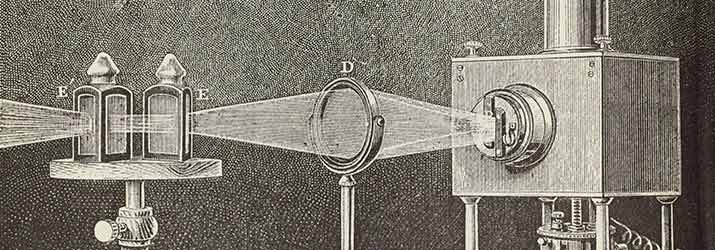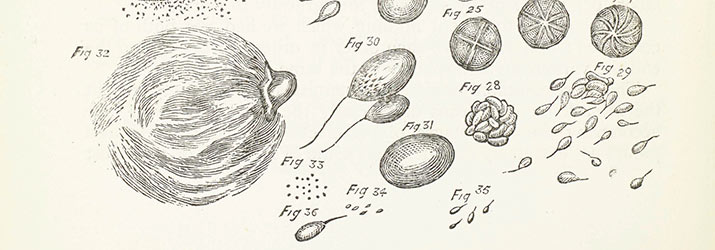Lecture series
As one would expect the majority of the lecturers were drawn from the staff at Owens College and names such as Williamson and Roscoe will be familiar if only through walking by the buildings on the University campus bearing their names. The scope of the topics covered, however, was wide-ranging and a number of internationally renowned figures did draw large general audiences in venues right across the city. Heralded in The Times as “a good proof of ‘the right thing in the right place,’” [The Times, 25 December 1875] the quality of the Lectures was also praised in glowing terms within the greater scientific community:
“What sane reviewer dare venture to criticise the collective wisdom of Professors Huxley, Tyndall, Roscoe, Gladstone, Geikie, Balfour Stewart, Odling, Clifford, W.C. Williamson, Wilkins, Ward, Jevons, Drs Carpenter and Huggins, Mr Spottiswoode, Sir John Lubbock, and other famous men who make up the brilliant array of Manchester Lecturers?”
'The Manchester Science Lectures', Nature 2 December 1875, p.83
Methods of delivery varied and unfortunately, some of the more dramatic demonstrations and experiments, such as those illustrating developments in explosive 'Gun Cotton' aren’t readily reproducible online! (Its success with the Manchester public, however, may be inferred by Frederick Abel’s return visit from the Woolwich Arsenal to address 'The Modern History of Gunpowder' at a significantly larger venue – Manchester’s renowned Free Trade Hall). However, the printed versions of the lectures (from the Eighth Series onwards) were increasingly enhanced with often quite striking illustrations – and a sample selection can be viewed in the image carousel below, which also links to the relevant full text.



First Series (Oct. 1866 – Feb. 1867)
- Elementary Chemistry 1: Indestructibility of matter and of energy - Henry Roscoe
- Elementary Chemistry 2: Chemical combination - Henry Roscoe
- Elementary Chemistry 3: Sulphur - sulphuric acid - soda - soap - bleaching - Henry Roscoe
- Elementary Chemistry 4: Carbon - coal - flame - Henry Roscoe
- Zoology, Or Four Plans of Animal Creation 1: First Plan: Jelly-like Animals - Life without Organs - Thomas Alcock
- Zoology, Or Four Plans of Animal Creation 2: Second Plan: Star-shaped Animals - Stomach - Thomas Alcock
- Zoology, Or Four Plans of Animal Creation 3: Third Plan: Jointed Animals - Locomotive Organs - Thomas Alcock
- Zoology, Or Four Plans of Animal Creation 4: Fourth Plan: Soft-bodied Animals - Digestive and Secreting Organs - Thomas Alcock
- On Coal: Its Importance in Manufactures and Trade - William Stanley Jevons
- Elementary Physiology 1: Food and Digestion - John Edward Morgan, M.D.
- Elementary Physiology 2: Digestion, the Chyle, and the Blood - John Edward Morgan, M.D.
- Elementary Physiology 3: The Blood (concluded) and the circulation - John Edward Morgan, M.D.
- Elementary Physiology 4: Breathing, and the Organs with which we breathe - John Edward Morgan, M.D.
Second Series (Nov. 1870 – Feb. 1871)
- Coral and Coral Reefs - Thomas Huxley
- Spectrum Analysis - Roscoe, Henry E. - Henry Roscoe
- Spectrum Analysis, in its Application to the Heavenly Bodies - Sir William Huggins
- Our Coal Fields - William Boyd Dawkins
- Charles Dickens - Sir Adolphis William Ward
- The Natural History of Paving Stones - William Crawford Williamson
- The Temperature and Animal Life of the Deep Sea - William Benjamin Carpenter
- How Coal and the Strata in Which it is Found is Formed - A.H. Green
- The Sun - Sir Norman Lockyer
Third Series (Nov. 1871 – Dec. 1871)
- On Yeast - Thomas Huxley
- On Coal Colours - Henry Roscoe
- The Origin of the English People - Augustus S Wilkins
- The Food of Plants - William Odling
- The Unconscious Action of the Brain - William Benjamin Carpenter
- Epidemic Delusions - William Benjamin Carpenter
- The Progress of Sanitary Science - Henry Roscoe
Fourth Series (Oct. 1872 – Feb. 1873)
- The Rainbow - Henry Roscoe
- The Ice Age in Britain - James Geikie
- The Sun and the Earth - Balfour Stewart
- Atoms - William Kingdon Clifford
- Flame - Thomas H. Core
- The Life of Faraday - J.H. Gladstone
- The Star Depths - Richard A. Proctor
- Kent's Cavern - William Pengelly
- A Fragment of Faraday's Electrical Discoveries - Sir William Barrett
- Ancient and Modern Egypt; or, the Pyramids and the Suez Canal - William Benjamin Carpenter
Fifth Series (Oct. 1873 – Dec. 1873)
- Polarisation of Light - William Spottiswoode
- How Flowers are Fertilised - Alfred W. Bennett
- Parasites, and Their Strange Uses - T. Spencer Cobbold
- Gun Cotton - Sir Frederick Augustus Abel
- Animal Mechanics - S. Messenger Bradley
- The Senses - G. Croom Robertson
- Muscle and Nerve - Arthur Gamgee
- The Time That Has Elapsed Since The Era of The Cave Men of Devonshire - William Pengelly
Sixth Series (Oct. 1874 – Dec. 1874)
- Crystalline and Molecular Forces - John Tyndall
- John Dalton And his Atomic Theory - Henry Roscoe
- On The Transit of Venus - Sir William Huggins
- Joseph Priestley: His Life and Chemical Work - T. E. Thorpe
- The Geographical Distribution of Mammals - Philip Lutley Sclater
- Earthquakes and Volcanoes - William Crawford Williamson
- Modern Savages - Sir John Lubbock
- Palestine Exploration: The Ancient and Modern Water Supply of Jerusalem - Sir Charles William Wilson
Seventh Series (Oct. 1875 – Dec. 1875)
- Arctic Discoveries, with Special Reference to the Present Expedition - J. E. Davis
- Soap Bubbles - A. W. Rücker
- The Birds of the Globe - Richard Bowdler Sharpe
- The Great Extinct Quadrupeds - P. Martin Duncan
- Cavendish and his Discoveries - T. E. Thorpe
- The Functions of the Brain - David Ferrier
- On Food - Henry Edward Armstrong
- The Time That Has Elapsed Since The Era of The Cave Men of Devonshire. Part II. - William Pengelly
Eighth Series (Oct. 1876 – Nov. 1876)
- What the Earth is Composed of I - Henry Roscoe
- What the Earth is Composed of II - Henry Roscoe
- What the Earth is Composed of III - Henry Roscoe
- The Succession of Life on the Earth I - William Crawford Williamson
- The Succession of Life on the Earth II - William Crawford Williamson
- The Succession of Life on the Earth III - William Crawford Williamson
- Why the Earth's Chemistry is as it is I - Sir Norman Lockyer
- Why the Earth's Chemistry is as it is II - Sir Norman Lockyer
- Why the Earth's Chemistry is as it is III - Sir Norman Lockyer
Ninth Series (Oct. 1877 – Dec. 1877)
- The Beginnings of Life I - P. Martin Duncan
- The Beginnings of Life II - P. Martin Duncan
- Flame I - T. E. Thorpe
- Flame II - T. E. Thorpe
- Modern Discoveries in Sound I - Thomas H. Core
- Modern Discoveries in Sound II - Thomas H. Core
- The Cruise of the Challenger I - Sir John Murray
- The Cruise of the Challenger II - Sir John Murray
Tenth Series (Nov. 1878 – March 1879)
- The Circulation of the Blood - Thomas Huxley
- The Sun - Henry Roscoe
- The Aborigines of Tasmania an Extinct Race - William Henry Flower
- Insectivorous Plants - William Crawford Williamson
- Edison, and Some of His Inventions - Sir William Barrett
- Our Earliest Ancestors in Britain - William Boyd Dawkins
- The Modern History of Gunpowder - Frederick Augustus Abel
- Minute Forms of Life - William Henry Dallinger
- Animal Intelligence - George John Romanes
Eleventh Series (Oct. 1879 – Dec. 1879)
- Islands, As Illustrating The Laws of the Geographical Distribution of Animals - Alfred Russel Wallace
- The Age Of Dragons - B. Waterhouse Hawkins
- Palestine In Its Physical Aspects - H. B. Tristram
- Traps To Catch Sunbeams - Sir William de Wiveleslie Abney
